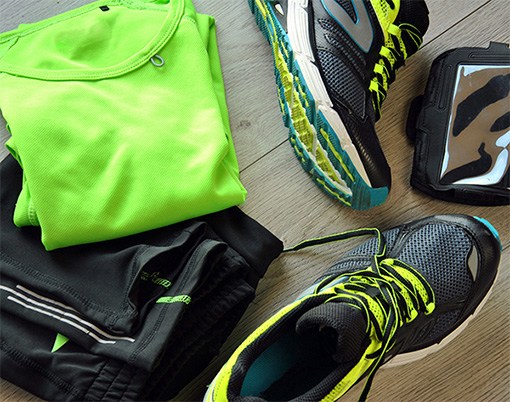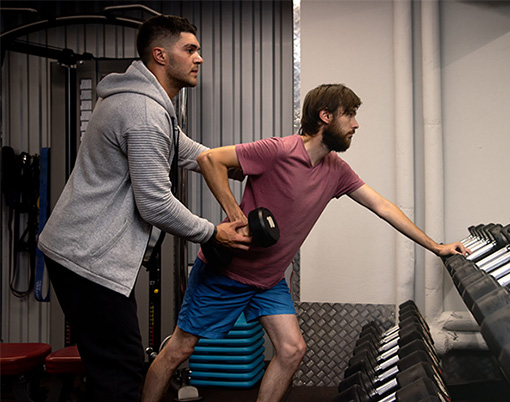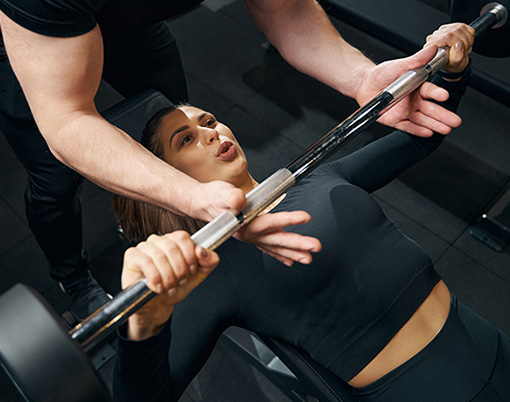New to Exercising? Here are some tips!
by Colin Butler
Vertex Education Ambassador
Get the right gear.
Does this sound familiar? You’ve had your eye on a pair of shoes or leggings and you like how they look when you’ve tried them on. You’re not alone. Maybe you decided to treat yourself for getting started with an exercise routine. We’re all about rewards, but we caution you to think function over fashion. The last thing you want to do is buy clothes solely for the purpose of matching an aesthetic and end up in discomfort or pain if they’re not optimal for their intended purpose.
Buy comfortable shoes that fit and clothes that allow you to move freely. How often can you realistically expect to go to the gym with uncomfortable shoes? Keep in mind that the only person that’s going to critique your outfit is you. When it comes to clothing, the most important thing to consider is how the clothing makes you feel. Clothing should make you feel confident and powerful.

Don’t be intimidated to ask for help at the gym.
As someone that’s been in and out of the gym for over 17 years, I know this is easier said than done. You are surrounded by machines and equipment you may not feel comfortable using and surrounded by people that may seem kind of scary. Don’t worry about anyone else in the gym because, believe it or not, they’re too caught up in what they’re trying to do to focus on what you’re doing.
If you don’t know how to use a piece of equipment or you need assistance with a weight you feel unsure about, ask a personal trainer or trained gym staff! Typically, you can find them walking around the gym floor eager to help. Many gyms offer sessions with a trainer for an additional fee. It’s better to get help than to do something wrong and get hurt.

The hardest part of conquering gym intimidation is getting through those first couple of visits. Before you know it, you’ll feel comfortable and calm.
Tip from a Personal Trainer: Don’t be scared to ask for help. In fact, if you need help, go find the biggest, scariest-looking person at the gym. It may sound backwards, but the person that looks like they have been there the longest is generally the person that’s going to be the person happiest to help and give you quick tips. They were beginners once and aren’t going to judge you for asking for help. Though you may want to wait until they’re in a rest period to ask. That’s just good gym etiquette.
You can also look at the content we create here at BreatheStrong+ for tips and tricks, and feel free to ask us questions so we can help.
Expect a learning curve and start light.
You might not know exactly what you’re doing right away. You might do a couple of squats wrong or drop a few dumbbells before you feel comfortable, but that’s true of any skill. You weren’t born knowing how to ride a bike, and you weren’t born knowing how to do a back squat or swim. All skills take time to learn, and the longer you practice, the better you’ll get at it.
Be patient with yourself. Even people that have been exercising for a decade are still working to improve how well they perform during exercise.
Tip from a Personal Trainer: Take your time learning the movements. Focus on getting your technique down before you start adding weight. Everyone is worried about getting injured in the gym, and as someone that’s done it a few times, that never goes away. But if you go in and focus on doing the exercise correctly, the risk of injury drops a lot, and you’ll enjoy exercising more.
Focus on a handful of movements and variations of movements patterns (squat, lunge, hinge, push, pull, core) and get really good at them. Practicing the same movements for an extended period of time is one of the quickest ways to lessen the learning curve when you start.
It’s OK if you miss a planned workout.
What happens if you miss a single workout? Nothing, really. One of the hardest skills to learn is listening to your body and recognizing when it tells you that you need to rest some more. If you’ve been consistent with exercising for, say, a few weeks, you will lose absolutely nothing by skipping one workout to get some extra sleep or time to yourself. In this case, focus on other parts of wellness like meditating, taking time to make breakfast, or spending time with loved ones. Don’t beat yourself up about it — there’s nothing wrong with missing a planned workout or lifting lighter now and again.
Tip from a Personal Trainer: Ease into your routine. There’s nothing saying you can’t add extra days to exercise down the road. Try not to think about days off as a waste of time, instead, look at it as another day to give your body more time to recover. Exercising is just the initiation of change; when you take time off to rest and eat appropriately for your goals you’ll start to see changes.
Don’t stick with something you hate.
It’s ridiculously common to hear people brag about how they “survived” their workouts because they don’t like that way of exercising, but someone recommended it so that’s what they do. Exercise should be something that adds to your life and makes you feel good — not something you’re trudging through resentfully. If you think you hate a workout, you’re probably either not choosing workouts you enjoy or you could be working out for the wrong reasons. Doing workouts you hate is stressful and detracts from your happiness; and happiness is really beneficial for your health.
Tip from a Personal Trainer: I like to have my clients try different exercises or methods of training every 2-3 weeks when they get started. Not only does it keep them interested in variety, but maybe they like powerlifting or tai chi and didn’t know it. Once you find the way you enjoy exercise the most, stick to it and throw in variety as you want to.

Don’t overdo it.
Keep your exercise intensity in mind. High-intensity workouts like HIIT or Tabata are fun and a great way to work up a sweat, but they probably shouldn’t be done more than once or twice a week because the higher the exercise intensity, the more recovery time you’ll need.
Tip from a Personal Trainer: I recommend 2-3 days of moderate to intense exercise per week. It doesn’t necessarily have to be intense to make progress a week especially for people starting out. If you constantly feel tired because you’re not sleeping well, feel excessively sore, are always thirsty, or start dreading when it’s time to exercise, you probably need to take a few days off and focus on recovery.
Don’t fall into the comparison trap.
If you’re new to exercising, it’s easy to fall into the trap of comparing yourself to everyone around you or even influencers on social media. Don’t let yourself fall into that spiral! You are not the person you’re comparing yourself to. They have different genetics, a different fitness level, different goals, and may have more exercise experience.
What you’re doing is comparing the first chapter of your book to their chapter 17. You’re getting started with the story setting the stage and establishing who the characters are while they’ve already beaten Voldemort once.
Tip from a Personal Trainer: Remember that there is nothing superior about that person that allows them to have their abilities or physique, and it doesn’t in any way take away from the benefits that you’re receiving from your exercise. The only person you should compare yourself to is you from yesterday. Did you get better? Did the workout feel easier? Did you lift more weight or more reps? If you did any of these things, you’re doing great, and you should be proud of what you’ve accomplished so far.

